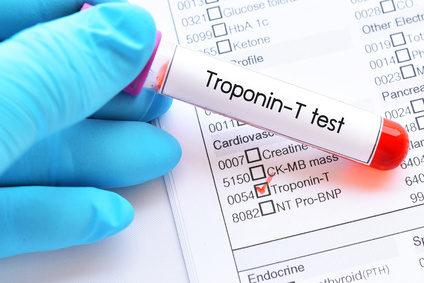Patients with an acute stroke often suffer heart complications, which should be recognised and treated early. Identifying the mechanism of the heart damage is of great importance here. However, this often presents the treating physicians with diagnostic challenges. This is because in individual cases it is difficult to say whether stress-induced heart damage or an acute heart attack, i.e. a circulatory disorder of the heart muscle, is present. To date, there are no well-established diagnostic methods to clearly differentiate between the two without examining the patient with a cardiac catheter.
Troponin is determined in the blood and is currently the most sensitive marker for recognising damage to the heart muscle. In patients with chest pain and elevated or rising troponin levels, a cardiac catheterisation (coronary angiography) is routinely performed to diagnose and treat a possible heart attack. During this procedure, the doctors insert a stent for treatment if there is a vascular occlusion or critical narrowing.
Elevated troponin levels are found in every second stroke patient and in every seventh patient they are so high that the criteria for diagnostic clarification by means of cardiac catheterisation for a possible heart attack are met. However, the benefit of cardiac catheterisation in stroke patients is still unclear. In everyday clinical practice, this examination is therefore currently only rarely carried out - in around one to two per cent of stroke patients.
In the PRAISE (PRediction of Acute coronary syndrome in acute Ischemic StrokE) study, cardiologists and neurologists from the DZHK and DZNE have now discovered that half of all stroke patients with highly elevated troponin levels actually have a heart attack. ‘This is a surprisingly high proportion, at least from a neurologist's point of view; we had not expected so many heart attacks,’ says Prof Matthias Endres, Director of the Department of Neurology with Experimental Neurology at Charité - Universitätsmedizin Berlin and researcher at the DZNE site in Berlin. He led the study together with his Charité colleagues Prof Christian Nolte and Prof Ulf Landmesser from the Deutsches Herzzentrum der Charité (DHZC).
It turned out that around 20 per cent of stroke patients have a type 1 heart attack, which needs to be treated immediately. The rupture of a vascular deposit (plaque) and clot formation in the coronary artery often leads to a heart attack. "In the PRAISE study, a more than five-fold increase in troponin levels indicated a high probability of a type 1 heart attack. This is a relevant finding. The new threshold value can help to decide which patients with a stroke should undergo coronary angiography,’ says Nolte, first author of the study and senior physician at the Department of Neurology with Experimental Neurology at Charité. A further 30 per cent had a type 2 heart attack, in which no thrombus formation and no severe narrowing of the blood vessels led to the infarction. In this case, the oxygen deficiency develops due to a complex interplay between oxygen supply and demand in the heart.
Dynamics provide no indication of myocardial infarction
In patients with chest pain, the primary focus is on the progression of the troponin value over time. In particular, an increase or decrease (‘dynamic’) of at least 20 per cent is relevant for the probability of an acute myocardial infarction. ‘Contrary to our expectations, however, such dynamic changes in troponin in stroke patients did not have good predictive power to clarify the mechanism of myocardial damage and to distinguish between circulatory disturbance and nerve-mediated cardiac dysfunction,’ says Landmesser, Director of the Department of Cardiology, Angiology and Intensive Care Medicine at the DHZC.
Treatment study planned
‘PRAISE is a diagnostic study to better understand the mechanism of heart damage,’ emphasises Endres. ‘Next, we want to conduct a treatment study to investigate whether we can improve the prognosis of stroke patients with fivefold elevated troponin levels with the help of a cardiac catheter and the appropriate treatment.’ Only then will it be possible to make binding recommendations for clinical practice.
In the study funded by the DZHK and DZNE, cardiologists and neurologists worked closely together at all levels, starting with the application process and continuing through to the study teams at the 26 participating clinics. A total of 254 patients with an acute stroke and highly elevated troponin levels took part in the study. 47 per cent were women and the mean age was 75 years. All participants underwent an ultrasound scan, an electrocardiogram (ECG) and a blood test. The results were analysed by a standardised endpoint committee.
‘The results of our study show how important the connection between heart and brain is in acute ischaemic stroke and lay the foundation for further studies in cardiology and neurology,’ says Endres.
Study: Prediction of Acute Coronary Syndrome in Acute Ischemic Stroke - PRAISE-DZHK19 I DZNEB001
Original publication: Myocardial Infarction in Patients With Acute Ischemic Stroke (Nolte et al., 2024, JAMA Neurol)
Editorial: Time to Think About Myocardial Infarction in Acute Ischemic Stroke (Seitz and Merkler, 2024, JAMA Neurol)
Scientific contact: Prof Matthias Endres, Director of the Department of Neurology with Experimental Neurology, Charité - Universitätsmedizin Berlin, matthias.endres(at)charite.de
Contact: Christine Vollgraf, Press and Public Relations, German Center for Cardiovascular Research (DZHK), Tel.: 030 3465 529 02, presse(at)dzhk.de


